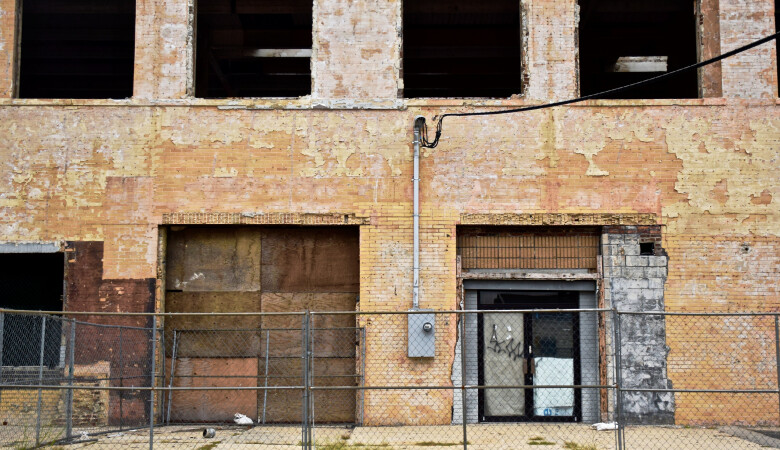Built Wisely Is Built to Last: Jesus Prepares Us For Judgment Day (Matthew Sermon 24 of 151)
July 18, 1999 | Andy Davis
Matthew 7:24-29
Judgement Day, Judgment
Introduction
Turn to Matthew 7:24-29 as we complete our study in the Sermon on the Mount. We're pointing to this conclusion in the same way that Jesus pointed to it, namely that we should hear the word of God with a heart to obey. When I was in Japan as a missionary, I experienced one of the most terrifying and remarkable experiences of my life on January 31, 1995. It was a Tuesday morning, and every Tuesday I used to go to the house of an older Japanese man, and his wife. He was the pastor of the small church I was working with there. We would have a wonderful time ordinarily, praying together and eating a Japanese breakfast. They would be very patient with my Japanese language skills, and we would talk together. It was a very pleasant thing and I enjoyed it a lot, but that morning was different than any other because that morning as I was getting dressed, the entire house began to shake.
It was shaking so strongly that the curtains in the room were moving back and forth as if being blown by a strong breeze. It was a 7.1 earthquake in our city. At that particular moment, I really didn't know what I was thinking. I know that one of my children came down with eyes as wide as saucers and said that a giant was shaking the house. But it wasn't a giant— it was that the very ground on which the house was built was moving. The earthquake was centered on Awaji Island, which is halfway between Tokushima, the city where we lived, and the major population area of Kobe. In that city, it went much worse for them than it went for us. Over 5,000 people died in that earthquake. Yet God was gracious because it came so early in the morning that tens of thousands of Japanese commuters had not yet begun their commute. A couple of months later I went to see the damage in the city with a friend of mine, and we looked at the damage done to the Hanshin Expressway— an elevated super highway. It was built with all the best Japanese technology but had toppled over in the midst of the earthquake. I looked at the foundation of it which had been wrenched and twisted, causing the whole toppling at that point. The Earth had moved, there had been a split in the earth, right at that place and the whole thing had toppled. It's interesting because the Japanese people are well aware that they live on a major fault and they're always ready for earthquakes. It just shows the futility of human effort with such power, as that, but it also underscores another point. It's the very point, that Jesus seeks to underscore here — if the foundation is moved the whole structure topples. If the foundation is not secure, if the foundation is movable, then everything on that foundation is vulnerable. The flip side is, if you can find a foundation that will not move then anything built on it is safe and secure.
That's the very point that Jesus makes here when he says in verse 24, "Therefore everyone who hears these words of mine and puts them into practice is like a wise man who built his house on the rock, the rains came down, the streams rose, and the winds blew and beat against that house, yet it did not fall because it had its foundation on the rock. But everyone who hears these words of mine and does not put them into practice is like a foolish man who built his house on sand. The rains came down, the streams rose, and the winds blew and beat against that house, and it fell with a great crash." Verse 28 says, When Jesus had finished saying these things, the crowds were amazed at his teaching, because he taught them as one who had authority and not as their teachers of the law.” And that's the end of the Sermon on the Mount. Now, as we've seen throughout the Sermon on the Mount, it's so important that we understand the context, and especially when a section that you begin preaching on begins with the word, "Therefore." The word, "Therefore," connects it logically to what we were just talking about. And what were we just talking about?
In verse 21, it says, "Not everyone who says to me, Lord, Lord will enter the Kingdom of Heaven. But only those who do the will of my Father who is in Heaven. Many will say to me on that day, Lord, Lord did we not prophesy in your name. And in your name drive out demons and perform many miracles. Then I will tell them plainly. I never knew you, away from me. You evil-doers. Therefore, everyone who hears these words of mine and puts them into practice... " Etcetera, etcetera. Do you see the connection? The connection is between those who claim to be Christians and really are, and those who claim to be Christians and really aren't. What is the difference? The difference is, one hears the word of God and put it into practice, the other hears the word of God and neglects it, ignores it, disobeys it. That's the connection to the immediate context. "Therefore," Jesus said, if you don't want this to happen to you, if you don't want to be there on Judgment Day and be shocked and surprised that Jesus didn't know you, then listen to the end of the Sermon on the Mount and test yourself to see what you've done with the whole Sermon on the Mount.
Did you hear and obey? Did you seek to put it into practice or did you not? That is the issue. Jesus is getting us ready for that. Then there's the whole larger context of Chapter 7. Throughout chapter 7, Jesus has been getting his people ready for Judgment Day. He begins by discussing that we should not judge or we will be judged. Right away at the beginning of Chapter 7, there's this sense of judgment. In verse 12, he says, that the law and the prophets are summed up with the simple thing that you should do to others what you would have them do to you. That's a Judgement Day oracle. In other words, as you look at the way you deal with others, do you follow and submit to the summation of the law and the prophets? Then Jesus challenges us that we should enter the narrow gate and follow that narrow road. “For wide is the gate and broad is the road that leads to destruction and many travel along that road.” Jesus is consistently getting us ready for Judgment Day, he says, "Watch out for false prophets. They're pointing the wrong way, they're leading you to that wide gate and that easy road. Don't listen to them but follow me.”
He's getting us ready for Judgment Day. But then there's the context of the whole Sermon on the Mount, and what has been the theme of the whole Sermon on the Mount? It is the heart righteousness that is characteristic of the kingdom of Heaven. In other words, there is a heart righteousness, a righteousness inside, that is characteristic of everyone who belongs to the kingdom of Heaven. Therefore, Jesus finishes up this sermon with a strong application to say, that this kind of heart-righteousness inevitably produces a certain kind of life, a certain kind of fruit. "Thus by their fruit, you will know them," Jesus said and the same is true of us. That is the context.
The Parable of the Two Houses: Similarities
Now let's look at this parable. A parable is an extended simile; a comparison between some kind of scenario that you can see in everyday life and the Kingdom of Heaven. Jesus is talking about a wise and a foolish builder. Let's begin by looking at similarities between the two builders. The first similarity I notice is that both the wise and the foolish hear the words of Jesus. It says, "Therefore everyone who hears these words of mine and puts them into practice," etcetera. And then in Verse 26, "Everyone who hears these words of mine and does not put them into practice." So both the wise and the foolish builder hear the words of Jesus. It's a serious challenge to us that we are responsible for what we listen to. You may have thought it was kind of a tame thing to come and sit on Sunday morning and listen to the Word of God. It's not. You're held accountable for what you listen to. You're held accountable to do something about it. Jesus is saying that merely hearing the words of Jesus is not sufficient. There is a foolish builder who hears the words of Jesus, and doesn't do anything about it. We comfort ourselves sometimes by saying, "Well, I attend worship. I’m there. I listen to it week after week." You've just met the first condition, you've heard the words of Jesus. A second similarity is that both search out a foundation. One of them searches out and finds a solid rock while the other one finds sand. They are both searching out a place on which to build, looking for something on which to base their home. Isn't that a similarity between the wise and the foolish, they're both constructing something. They're working hard at it, laboring at it every day. They're both building a house— tremendous energy expended every day by both the wise and the foolish builder. Both of them experience the same testing of that house. Jesus is very parallel in his expressions here. The rains came down, the streams rose, the wind blew and beat against the one house, but it did not fall because it had its foundation on the rock. The rains came down, the streams rose, the winds blew and beat against the other house but it fell with a great crash. Same test for both house. Both houses get tested. And it's not just any testing is it? It's a vigorous testing. It's a strong testing. It's the kind of testing that leaves one stable and strong, and the other one basically in rubble, totally flattened.
The Parable of the Two Houses: Differences
What are the differences between the two builders? The first difference is in terms of who the builders are. One of them is wise and the other one is foolish. It all starts with the heart, are you wise or are you foolish? It's talking again, I think, here about heart-righteousness, which leads to wisdom. Remember I said the whole key to the entire Sermon on the Mount is what? "Blessed are the spiritual beggars for theirs is the Kingdom of Heaven." Spiritual beggars are wise because they recognize their own emptiness, their own neediness. Now, a wise builder, who's a spiritual beggar comes to the Lord and says, "How shall I build?" Actually he begins by saying, "Where shall I build?" But that's the beginning of wisdom isn't it? The fear of the Lord is the beginning of wisdom. It's the knowledge that you need the Lord, that you need a Savior, that you're a sinner and that only by God's grace can you be saved. This produces a certain heart righteousness, which leads to wisdom and wisdom is inevitably proved right by its actions. Matthew 11:19 says, "Wisdom is proved right by her actions." If you want to see wisdom, just watch. You can just see the way someone lives— somebody lives wisely, somebody else lives foolishly. So that's a difference between the two builders— one of them is wise, and the other is foolish. The second clear difference is that one of them hears the words of Jesus and obeys, whereas the other one hears the word of Jesus and does not obey. Now, “does not obey,” does that mean disobey, or does it mean forget or does it mean change it a little bit? What does it mean? I think it means all of those. You take the words of God and just don't do what Jesus says. You start to change things, you neglect them, you forget them, you disobey them, whatever. Obedience to the words of Jesus are not part of your life.
But one of them, the wise builder, now he's different. He hears the word, and he seeks to obey. When he listens to the Sermon on the Mount, he says, "What am I going to do about this? Jesus has told me to enter the narrow gate. Did I enter the narrow gate? Am I walking along the narrow road?" There's a concern in the heart of the wise builder as he hears the words of Jesus, "What shall I do? It says that if my right hand causes me to sin I should cut it off and throw it away. Well, what does that mean? Certainly it doesn't mean to literally cut off my hand because then I'll have my left hand and I can sin with that one. So it doesn't mean that, but it does mean something. Jesus said something to me. And am I going to live this out?" You see there's a concern to obey, to hear the words of Jesus and to put it into practice. Jesus said in John 14:15, “If you love me, keep my commands.” Jesus said the same thing in John 15:10, "If you obey my commands, you will remain in my love just as I have obeyed my Father's commands and remain in his love." John 15:14, "You are my friends, if you do what I command."
It's just that simple connection between being a friend of Jesus and obeying him. It's just that simple. There's that big two letter word, "If," "You are my friends if you obey me." So if you want to be a friend of Jesus, obedience must be part of your life. 1John 2:3, and following says, "We know that we have come to know him, if we obey his commands. The man who says I know him but does not do what he commands is a liar and the truth is not in him, but if anyone obeys his Word, Gods love is truly made complete in him." This is how we know we are in him, whoever claims to live in him must walk as Jesus did. There needs to be a principle of life obedience in the person who truly knows Jesus. That's all Jesus is saying here at the end of the Sermon on the Mount.
The key difference between the two is that one of them hears the word and puts it in the practice, the other one hears the word and does not put it into practice. I have to ask you by way of application, what do you do with the words you hear? What do you do with the Word of God? It is a dangerous skill, to be able to listen to a sermon and do nothing about it. Some people are experts at it. They're able to listen to any kind of preaching and it makes no impact on their lives whatsoever. Don't develop that skill, run away from it. The way you run away from it is to run and embrace the commands of God. Say, "God, I want to put this into my life. I don't want to keep living the way I'm living. I want to be different." But it's a dangerous thing. So what do you do with the word you hear? I think the best thing to do is begin by trembling. It says in Isaiah 66:2, "This is the one I esteem. The one who is humble and contrite in spirit.” By the way, what's another way of saying “humble and contrite in spirit”? A spiritual beggar. "This is the one I esteem." Says God, "If you want me to esteem you, to think well of you, first of all, be a spiritual beggar. Second of all, tremble at my word." "This is the one I esteem. The one who is humble and contrite in spirit, and who tremble at my word." Isaiah 66:2.
It says that we are to tremble at the Word of God and what that means is to take God’s word seriously, saying God is speaking to me now, and I must obey. I must listen and obey. When you hear to obey, you begin to think of how your life will change in accordance with it. You must also remember to do what you've heard. Do you have trouble remembering the word of God? I think we all do. It says in James 1:22, "Do not merely listen to the word, and so deceive yourselves?" There's a self-deceit in thinking that because I listen to the Word of God, I'm a good person. "Do not merely listen to the Word of God, and so deceive yourselves, do what it says." It says anyone who listens to the word but does not do what it says, is like a man who looks at his face in the mirror and then after looking at himself, goes away and immediately forgets what he looks like. Have you ever looked at your watch, and then had to look at it again 10 seconds later because it didn't register? Well, that's the way the word is sometimes. You know you're supposed to look in and have it register, it's supposed to make an impact on... You're supposed to hear and obey.
Another difference between the two builders, the wise and the foolish, is that one house survives the test and the other house does not survive the test. The wise man’s house is still left standing at the end of the test, whereas the foolish man's house has fallen with a great crash. Did you ever notice that Jesus finishes his wonderful Sermon on the Mount with a great crash? "Great was the fall of it,” it says in another translation. A tremendous fall is the finish of the Sermon on the Mount, but it doesn't need to be that way. The wise Man's house is still standing after the test. Is it a possible to live a life, 60,70,80 years here on earth and have something to show for it at the other side of Judgment Day? Jesus says it is. The grace of God teaches us how. It's possible to make it through the test and have something to show for your life. It's possible to find a rock that doesn't move on Judgment Day. It's possible to build a house that will survive the test, just as there is the possibility of a house that falls with a great crash and it's gone. All the labor has disappeared, it's gone. The key difference between the two of course is the choice of foundations. It says that the wise man's house did not fall because it had its foundation on the rock. The foundation means everything. The foolish man's house falls with a great crash because it has its foundation on the sand.
What's the difference between the rock and the sand? Have you ever stood by the waves and as they come in, the sand starts getting sucked out from under your feet, and you start to tip. What is the difference between the two foundations? One of them does not move. The other one moves away; it disappears under the test. What is Jesus talking about here? Well, let's see if we can interpret the parable. The wise and foolish man are both hearers of Jesus. You can call yourself a disciple of Jesus Christ, but you may not be saved. Jesus is talking to people who are listening to him, but he's talking to us too. He's talking to anybody who hears the Sermon on the Mount, or really any word of God.
But let's focus on the Sermon of the Mount, "Wise and foolish builders both hear these words of mine," says Jesus. The wise man begins with a broken heart over sin. He remembers what Jesus said.”Blessed are the poor in spirit, for theirs is the Kingdom of Heaven." He says, "I want the Kingdom of Heaven," and he goes on from there. The foolish man just listens and says, "Isn't that an interesting metaphor? A spiritual beggar? I've never really heard that one before. Now, that's interesting, I need to write that one down." But there's no obedience, there's been no change. The parable divides people by how they listen and what they do with it. The wise man as he listens, he builds his whole life on Jesus Christ. It says in 1 Corinthians 3: 11, "No one can lay any foundation other than the one already laid, which is Jesus Christ.” He is the foundation, he is the solid rock. “On Christ the solid rock I stand, all other ground is sinking sand.” It moves away. Jesus says, "If you build on me, you'll stand firm, because I'm not going away." It says in Hebrews 1, "In the beginning Oh Lord, you laid the foundation of the Earth, and the heavens are the work of your hands. They will perish, but You remain." Isn't that powerful? Hebrews 1:10, "The heavens and the earth will perish, they will go away." But who remains? Jesus remains, he's the solid rock. And if you build on him, you will survive judgment day. Everything you see with your eyes, anything you can touch, you can taste, you can hear, it is temporary. It's not a solid foundation, it's earth-bound, and it will not survive the test. If you're building on that, you're building on sand.
The wise man after basing his life on Jesus, comes to Jesus and says, "I'm hungry for you to tell me what to do, I see your authority, I see your leadership, and I want to obey you." So he scours the beatitudes, he begins to hunger and thirst after the law of God. He takes the law and searches his own heart and he finds anger, and lust, and broken covenants in there, and he wants to change [Matthew chapter 5]. When he moves into chapter 6 he says, "You know, I've done righteous deeds to be seen by men, I don't want to live that way. I want to live for a secret God who sees my heart. I want to live to please God. I want everything to change." This is the wise man. And he begins building his life, day after day, he begins to knock those pieces into place, to put the doors and the windows— he's building his house. He does it in obedience and submission to the authority of Jesus Christ. Ultimately that man is living for an eternal city that has foundations which cannot be shaken. It says in Hebrews 11:10, that Abraham was looking ahead or forward to a city with foundations whose architect and builder is God. That is a city that's not going to be shaken on Judgment Day. This wise builder is living for that city, and he's building accordingly.
Now, the foolish man is different. He hears the words of Jesus, the Sermon on the Mount, but he has an independent spirit. He doesn't really think he needs Jesus's advice, thank you very much. He knows how to go about building his life, he knows how to make his house, he knows how to put together his own blueprints, he knows how to choose his own foundation, "Over there looks good, it's right near the river, plenty of water, comfortable place. Who cares that there's sand there? It looks pretty solid for now.” And so he knows how to choose his own foundation, he knows how to select his building materials. He doesn't need to go to Jesus's building school and be trained on how to build his house. He's not listening to Jesus, he knows how to build his own house himself. Maybe he's a career-oriented man, who's building a career wrongly as he's climbing the ladder of success. Maybe it's a woman who's doing the same thing, or maybe it's just a simple person who just ignores the Bible and just doesn't really care what Jesus has to say. But this foolish builder has chosen the foundation on his or her own and is building accordingly. Notice how the foundation also affects the building technique. When you enter through the narrow gate you travel on a narrow road. When you enter though the broad gate you travel on a broad road. When you choose a rock for a foundation you build accordingly, you build to last. When you build on a sandy foundation, you build accordingly, and everything will be destroyed. Now, what is the wind, the rain, the rising stream in the parable. It's Judgment Day. It's the testing of the foundation that God has already promised. Hebrews 1:10, "Everything you see will disappear.” It's true. Hebrews 12:26, "Now, he has promised, once more I will shake, not only the earth, but also the heavens." When he gets done shaking there'll be nothing left, except what's eternal.
On Judgment Day everything will shake out. 2 Peter 3:10, "The day of the Lord will come like a thief.” That means it'll come unawares; it'll come when you're not expecting it. "The day of the Lord will come like a thief, the heavens will disappear with a roar, the elements will be destroyed by fire and the Earth and everything in it will be laid bare." Since everything will be destroyed in this way, what kind of people ought you to be? You ought to live holy and godly lives, as you look forward to the day of God. In speed it's coming. That day will bring about the destruction of the heavens by fire, and the elements will melt in the heat. In keeping with his promise, we are looking forward to a new heaven and a new earth, the home of righteousness. This one is permanent. If you are part of that new heaven and new earth by faith in Jesus Christ, you will last eternally. Jesus said, "Heaven and earth will pass away, but my words will never pass away." You build on Jesus, you will last and survive judgment day. You should say, "Hallelujah! I can get up in the morning and build something that's not going to be destroyed. I can work on the Kingdom of Heaven and it will last. Everything I do for Christ will make it through that Judgment Day, it will survive. But the things I do for myself, the things I do selfishly or apart from Christ, or heaven forbid that I have chosen a sandy foundation, the whole thing will disappear." So God has given us a way that we can survive Judgment Day and not only us but our works can come too. You can store up treasure in Heaven. You can build a house that will last.
The Authority of Jesus
In verses 28 and 29, Matthew concludes with two verses that you may have thought were somewhat of a throw-away but I don't think so. It says in verse 28, "When Jesus had finished saying these things, the crowds were amazed at his teaching, why because he taught them as one who had authority and not as their teachers of the law." Matthew finishes the Sermon of the Mount, by miraculously, marvelously, putting the focus on the person of Jesus Christ. You finish asking the question, "Who is this man who can teach us this way?" You should be marveling at that. Look at the Sermon on the Mount. Look at how marvelous it is. Look at the teaching, but may I ask you to finish by looking at the teacher, who said these things. The crowd is utterly amazed. They've never heard anything like this. This man comes from Galilee, a simple blue collar worker, a carpenter. He comes and does miracles like no one has ever seen before. Yes, there had been miracles in Israel's history, but not like this. The whole crowd is healed with a word; demons driven out. No one ever seen this kind of power. The same simple man climbs up on a mountain one day, sits down and begins to teach like this. Nobody had ever heard it before. This was incredible. The authority of Jesus Christ. They begin to ask, "Who is this man from Galilee? Where did he get this miraculous power and these teachings? Where did it come from?” It came from God, because he is the incarnate son of God. Jesus's authority was different than that of the teachers of the law. The teachers of the law would say, "Well, you know Rabbi Ben Hillel said this in commenting on what Rabbi so and so said about that.” And on and on they went. But Jesus said, "You have heard that it was said to the people long ago, but I say to you such and such." Incredible authority Jesus had. He makes confident assertions one after another. He says, "Blessed are the poor in spirit for theirs and theirs alone is the Kingdom of Heaven."
People thought, who are you to say that? How do you know who belongs to the King of Heaven or not? Jesus replies by his statement, “I’m able to tell you who's in the kingdom and who's not.” He makes confident assertions.He's able to say, "Rejoice and be glad, because great is your reward in Heaven." Can we take that to the bank? Are we sure that our reward will be great in heaven? Yes, because of who said it. It's Jesus who said it, therefore it's true. He makes confident assertions: “Unless your righteousness surpasses that of the Pharisees and teachers of the law, you will never enter the Kingdom of Heaven.” Can you make that kind of confidence assertion? If you're Jesus, you can. Seek first his kingdom and his righteousness, and all these things will be given to you as well. Is that a confident assertion? Yes, it is. Jesus can make it because of his authority, because of who he is. He has an independent authority. He's able to give direct commands. He gives one command after another in the Sermon on the Mount. He is acting like a king, isn't he? He's giving commands, almost 50 of them in the Sermon on the Mount because of his authority. Jesus is able even to give sweeping commands like, "Be perfect therefore as your Heavenly Father is perfect.” Jesus' reference, self-references are breathtaking. He talks about himself, saying, "Blessed are you when you are persecuted because of me, not because of the teaching I'm giving you, but because of me. Your reward will be the same as that of the prophets who were persecuted because of God." He's claiming to be God there. He says, "You, my disciples, you are the salt of the Earth, you're the light of the world, because of your relationship to me." Jesus says, "Do not think that I have come…” Stop right there at 5:17, "Do not think that I have come." Well, why did you come into the earth? Can any of you say, "I decided to come into the world to do this or that." No, your birth was somewhat passive when it came to you, you were suddenly born. You were born and then you began to live your life. Jesus said, "I have come for a purpose, but it's not to destroy the law or the prophets. I have come to fulfill them." He said, "I chose to enter the world.” Then he said, "I did come to fulfill the Law and the Prophets, everything Moses wrote and the Prophets wrote was about me." And Jesus says, "Not everyone who says to say to me, Lord, Lord." He's claiming to be the Lord; he's claiming to be God. Then he says, "Many will say to me on that day." He's claiming that he's going to sit on the judgment seat and people are going to come and make claims to him. They're going to come and present their lives to him. He's going to sit on the judgment seat and each one of us, all of us, will come before him and give an account. Jesus makes this claim. So as you look through the Sermon on the Mount you say, "This reaches to the lowest depths, the bowels of hell. And it reaches up to the highest heavens, who could give such a teaching?" Only the incarnate God, Jesus Christ himself.
Application
The authority of Jesus Christ is where we finish here, and that leads us very directly to our application. What is your relationship to this authoritative teacher? What is your relationship to Jesus Christ? Have you entered the narrow gate? Have you built your house on a solid rock? Have you chosen Christ as the solid foundation of your rock... Of your house? Or are you building on the sand? In order to know that you have to look at your obedience. I have to ask you, are you a spiritual beggar now? Would you consider yourself a spiritual beggar? How has hearing about salt and light changed your relationship to the world? Would you say that your relationship to the world is any different because you heard the Sermon of the Mount or is it still the same? If you've seen your right hand causing you to sin, have you in fact cut it off and thrown it away? Not literally, but if you've seen some pattern in your life that inevitably leads you to sin, are you doing anything about it, or you're just ignoring it? Are you more likely to turn the other cheek now than you were then. When somebody is offensive to you, or attacking you, do you find yourself being more meek, more humble and yielding, or is that that same old viper coming up from inside you? Do we turn the other cheek? Are you storing up treasure in Heaven? Are you storing up treasure in heaven or are you storing it up here on Earth? Do you pray as Jesus taught you to pray? Do you pattern your prayer life after that? These are just a series of applications that come naturally from the text. Are you still as anxious as ever you were? Maybe you were given to anxiety before, we heard a sermon on anxiety. Are you still anxious or are you doing something about it? Has it made any impact on your life or have you developed that skill of hearing a sermon and doing nothing about it, whatsoever?
And do you do to others what you would have them do to you? This is a series of applications. The key one, however, is choosing the rock, the solid foundation. If you have, then these things will start to grow in your life. I did not ask you, "Are you perfect in these areas?" I'm asking was there a change, a motion of movement, of obedience when you heard it? There was a specific application that I put into practice. Earlier, I gave you a specific application from a sermon, "Ask and it will be given to you, seek and you will find, knock and the door will be open to you." I urged you to read through 2 Peter 1:5-7, and Galatians 5:22 and 23 with your spouse or with a friend, somebody who knew you well, a Christian friend, somebody spiritually mature. And you were to ask that person now, "Which of these traits do you think I need to grow in the most?" You would humbly accept that person’s answer and
you would begin praying every day for that trait. And not only that, but you would say, "Which of these things do you want to grow in? And I'll pray for you too, I'll pray for you, and I'll pray for myself." Then the person probably would reciprocate, and do the same the other way. You were to pray daily for one year, and you were to check up at the end of the year and see how those things happened. Now, did you do it? If you say, "Well, I don't think that's a good application," that's fine. Make up your own application to ask and it will be given to you, seek and you'll find, knock on the door will be... but just be sure it's faithful to the text and that it leads you into a faithful prayer life. That's just one little microcosm. The key thing here is that Jesus did not mean for his words to come out and fall to the ground useless. They were meant to come out and transform our hearts and our lives. They were meant to change us and they were especially meant to lead those who do not know Christ as Lord and Savior into a saving knowledge, because hell is real. So says Jesus. And Heaven is real, so says Jesus. And judgement day is coming soon, so says Jesus. Be ready. Be sure that you have entered the narrow gate, be sure that you're traveling along that narrow road. More than anything if you feel like you have never given yourself to Jesus as Lord and Savior, even though you may have been baptized when you were 12 and it's been 40 years and you say, "You know, there's no fruit. I'm not a Christian, I really want to come to faith in Christ." Then come. The way of salvation is open. It is possible for you to live the rest of your life in obedience to God and build a house that will last on Judgement Day.






























